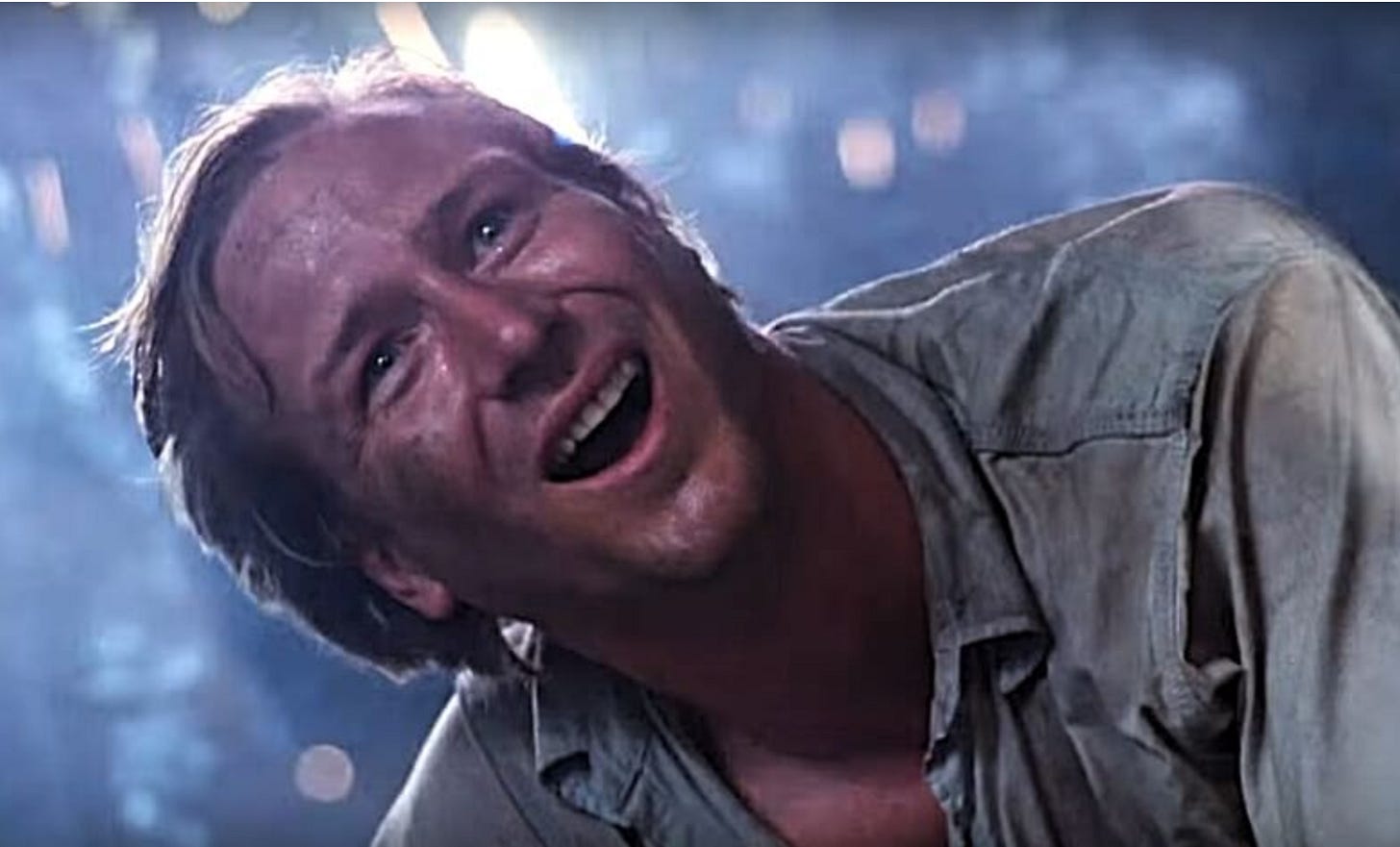What We Should Remember About William Hurt
Altered States and ape morality.
William Hurt’s death last year has led fans and critics to revisit the numerous high points of his career: Broadcast News, Children of a Lesser God, Kiss of the Spider Woman. My favorite of his films, though, may be his first.
Right at the beginning of his career, the 1980 psychedelic SF oddity Altered States is prime Hurt: a performance in which a wild-eyed, feral, weirdo character actor crawls out of his leading man good looks. It’s also a movie which, in its humanist and feminist message, speaks to the ugly accusations of sexual and domestic abuse against the actor, and to the ways in which powerful men can destroy other’s lives without accountability.
William Hurt, Goat Devourer
Directed by the idiosyncratic and brilliant director Ken Russell from a script by legendary screenwriter Paddy Chayefsky, Altered States is a verbose bizarre New Age riff on Frankenstein. Psychopathologist Edward Jessup (Hurt) is obsessed with the scientific roots of religious visions and altered states of consciousness. Abandoning his marriage to anthropologist Emily (Blair Brown), he uses drugs and sensory deprivation experiments to try to chase down primal experience. Eventually (and improbably!) he regresses himself to a Neanderthalesque early primate. If you want a movie in which William Hurt grows a lot of body hair and kills and eats a goat, this is your film.
Director Russell pursues this gloriously silly premise with his usual baroque sensuality. The camera lingers on Blair Brown in a number of Rubenesque nude scenes. But Russell is also the director who perhaps is most enraptured with Hurt’s physical beauty. The first time Emily see Edward he’s at the end of a hallway, the light behind him—he stands there, blonde and radiant, as if entering the female gaze from some angelic realm outside time.
As a mad scientist, Hurt demonstrates his unique ability to chew up all the available scenery through tactical deployment of underacting. Edward practically quivers with repressed enthusiasm, shifting from Hurt’s patented monotone earnest mumble into verbose blasts of extroverted psychobabble. When he’s down, his words feel like they’re being pulled out of him reluctantly, one by one. When he’s up, blocks of text race out in seamless streams of gonzo gab. “We're all trying to fulfill ourselves, understand ourselves, get in touch with ourselves, face the reality of ourselves, explore ourselves, expand ourselves,” he natters without taking a breath. “Ever since we dispensed with God we've got nothing but ourselves to explain this meaningless horror of life!”
If that makes Edward sound more than a little ridiculous—well, that’s the point. He wants to regress to an ape to avoid admitting that his family is important to him, which is more than a little pathetic. In the last third of the film, the point of view shifts towards Emily, as she watches her bizarre and ridiculous husband try to destroy himself, and steps in to save him. By the end, it’s clear this isn’t really Edward’s film at all. It’s not a story about a brave male scientist pursuing ultimate truths; it’s about a brave female scientist balancing her career and her love for this difficult, beautiful, “fascinating bastard.”
Genius as Regression
Altered States is, then, a fairly explicit criticism of the narcissism and implicit misogyny of male geniuses, and of narratives that center male genius narcissism.
Such abusive male geniuses unfortunately include Hurt himself, according to actor Marlee Matlin and other women who were in relationships with him. Matlin has said that Hurt was physically and emotionally abusive, and that on at least on occasion he raped her while she begged him to stop. Sandra Jennings, Hurt’s ex, also said Hurt physically beat her.
The Daily Beast notes that while Hurt pushed back against Jennings accusations, he “barely disputed” Matlin’s description of their relationship. Hurt also didn’t have any trouble finding work, and faced basically no consequences for the abuse. Matlin’s account was mostly treated as gossip, an interesting shadow on the story of a major Hollywood actor.
Following Hurt’s death, critics and fans have been discussing Matlin’s accusations again. In the post #MeToo era, they seem less like a sidenote, and more like a central facet of the actor’s legacy.
Amidst all the psychedelic imagery and ape regression, the message of Altered States is surprisingly clear and sensible: How you treat the people closest to you is more important than how brilliant you fancy yourself. Like Edward, Hurt was very talented—a “whiz kid.” But that’s not the only thing, and maybe not the main thing, we should remember about him.
This first ran in March 2022.




One of my favorite films. No coincidence that it contains some of the most memorable depictions of both Hell and academic midlife crisis.
when I think of William Hurt, I think of the greatest horror film of all time. It came out in the early 80's and Reagonomics was the new ideology. A group of 60's hippies, gathered for a reunion and were now all well off middle or middle-upper class supporters. Of course I'm referring to The Big Chill and the horrification was that it was more true than not of the hippie---my---generation. William Hurt was the only one that still maintained the 60's ideals. They made him into a drug dealer though, as if to say only addled minds, or those profiting off addled minds could be idealistic. So I found it the most angrifying movie I ever saw as well. It angered me so much I pretty much discontinued watching any movies.
Not perhaps William Hurt's best role, but his character stands out in my mind.